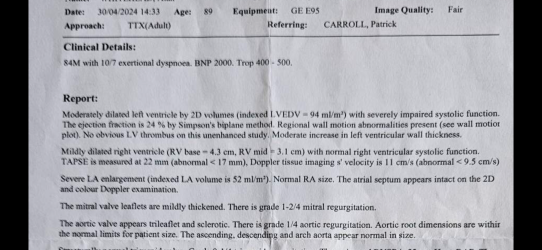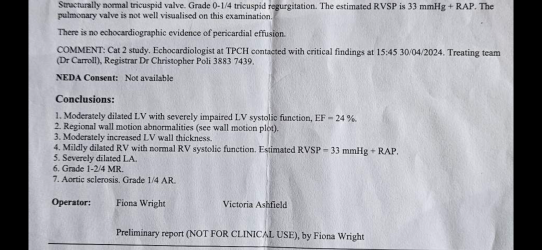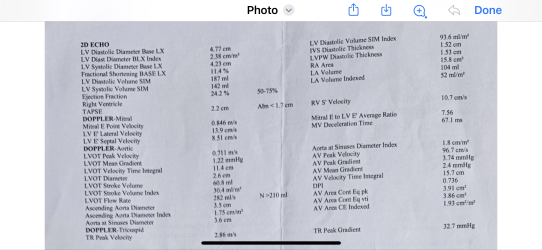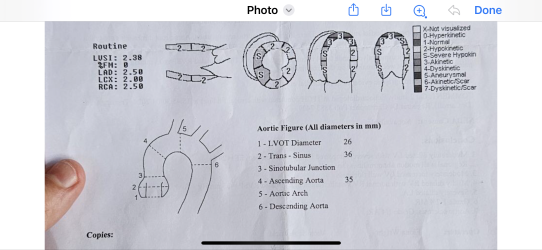Finally, asking for an extended family member. He’s 89 and until a month ago, working in his garden and shed (has all kinds of tools, as he was a sheet metal worker and welder).
He had a turn (breathless and disoriented) and went to hospital. Was there for a week whilst they organized various tests. Report given to me below seems to be the main issue is the left ventricle.
I get the main concern but would love some simple English - I didn’t go to hospital as I had my own issues at the time. We know it’s heart failure (life limiting).
View attachment 393701
View attachment 393702
View attachment 393703
View attachment 393704
What should so be researching to inform the relevant people?
You are right. Long post but hope it's helpful.
The major abnormality is impaired left ventricular function (should be >50%). This is sometimes called "left heart failure" or "cardiomyopathy", just "heart failure", or sometimes "HefRef" (heart failure with reduced ejection fraction)
There are some minor valve abnormalities but these are not likely to be clinically significant
The enlarged atria will give him a tendency to develop atrial fibrillation.
The regional areas of dyskinesia in the left ventricle point to the cause being reduced blood supply (ischaemia) almost always due to coronary artery disease.
The important thing about an ischaemic cause is that it may be partially reversible if the blood supply can be improved. On the other hand, the arteries could be already blocked and not reversible.
If he were a bit younger an angiogram would be pretty standard (especially with a raised troponin indicating acute cardiac ischaemia) with potential for stenting or bypass grafting if there were major narrowing of coronary arteries (stenosis). However at 89, with a delirious episode, the Cardiologists would need to assess his frailty and the pros/cons of an initial invasive procedure.
Alternatives might include looking for reversibility with a stress echocardiogram or nuclear medicine scan. A CT coronary angiogram may be used to screen for stenoses if he can tolerate lying flat and still for a prolonged period. However, they might decide that they wouldn't stent in any case and not do these tests if he is very frail
The other important thing about a reduced ejection fraction is that prognosis can definitely be improved with various medications; beta-blockers (drugs ending in -olol):, ACE or angiotensin receptor indicators (drugs ending in -pril or -sartan), spironolactone and entresto can all be tried. They all lower BP to some extent and this can be a limiting factor in their use.
Some very symptomatic patients with specific ECG findings benefit from a double-sided pacemaker but this would be unusual to do in an 89yo
If he has pulmonary oedema (fluid on lung) or peripheral oedema (fluid in extremities) he will usually be on a diuretic like frusemide (lasix). This doesn't improve prognosis in itself but improves symptoms. Ability to get rid of all fluid may be limited by low BP and/or kidney function
People with reduced ejection fraction do have limited life expectancy. The best predictor is exercise tolerance rather than the percentage ejection fraction but BP and kidney function are important too
One of the causes of death in people with heart failure is ventricular rhythm disturbances hence why some patients get implanted defibs. This can prevent you dying in your sleep which is sometimes the precise opposite of patients' wishes in their later decades


















